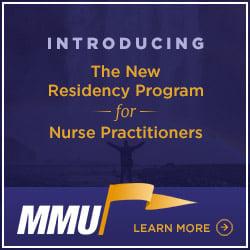The Worst Thing NPs Can Say in a New Grad Job Interview
Okay, okay, so there are a lot of ‘worst’ things you could do in a new grad nurse practitioner job interview. You could lug your infant in a car seat along with you, sparking immediate childcare concerns in the minds of a prospective employer. You could come dressed for an afternoon at the beach, in flip flops and cut-off denim shorts. You could cuss. A lot. But, assuming you’ve got the basics of job interview protocol and professionalism down, there is still one big mistake less experienced nurse practitioners make in the quest for employment.
As a new grad NP, it’s no secret that you’re ‘green’. You’ve got hundreds of clinical hours under your belt, however you still have a long way to go on the road to autonomy. Naturally, you will want to look for an employer that understands your new grad status, and has the resources to help you progress clinically along the way.
I personally talk with a number of soon-to-be nurse practitioners and new graduates. As I discuss their job search, one thing stands out as the reason many new grads land interviews, but don’t receive job offers. Too often, nurse practitioners highlight their inexperience and need for support.
‘Wait a minute?!’, you’re asking. How am I supposed to find a supportive clinical environment and ensure that the expectations placed on me are appropriate for my level of experience? It seems wrong to portray myself as experienced when I am not, right?
I’m not at all saying that you should not address your new grad status in a job interview. Nor, am I saying that you should not question the practice’s ability to help you develop your skills throughout the employment relationship. The conversation, however, shouldn‘t go like this:
New NP: “My preceptorships in my NP program were weak. My preceptor did not let me perform procedures, so I don’t know how to suture. He also had multiple students, so I felt like the experience wasn’t as good as it could have been. How do you help teach new graduates?”
Interviewer: “Well, we have an experienced physician who will also be working in the clinic, and she will be happy to answer your questions.”
New NP: “Okay, that sounds like a good arrangement. How many patients will I be expected to treat per hour?”.
Interviewer: “Our typical schedule has providers seeing three patients per hour. In your first few months, we can schedule you for two patients per hour.”
New NP: “That sounds like a lot – are you able to schedule one patient per hour, moving up to two per hour for at least six months?”.
Interviewer: “We can think about it. Tell me about your salary requirements”.
New NP: “The average salary in the area is $95,000. But, given that I have several years of experience working as an RN, I expect to make about $105,000.”
 Do you see what happened here? The nurse practitioner cast a negative light on his/her lack of experience signaling incompetence (not to mention that he/she might be a complainer), started negotiating for a lighter workload, then asked for a higher than average salary. Sorry, folks! Healthcare facilities are businesses, not educational institutions. They need to be getting something out of your terms of employment. It seems silly, but this type of conversation occurs more often than you might think.
Do you see what happened here? The nurse practitioner cast a negative light on his/her lack of experience signaling incompetence (not to mention that he/she might be a complainer), started negotiating for a lighter workload, then asked for a higher than average salary. Sorry, folks! Healthcare facilities are businesses, not educational institutions. They need to be getting something out of your terms of employment. It seems silly, but this type of conversation occurs more often than you might think.
I talk with a number of healthcare employers, both outpatient clinics and hospital systems, discussing their interactions and experiences with new graduates. Many express that new grad interviews go something like the above conversation. New nurse practitioners may ask for more support, lower patient volumes, and training. All of these are perfectly reasonable requests. However, when approached with a laundry list of wishes and a salary request in line with providers taking on more responsibility, this doesn’t go over well.
So, if you are a less experienced provider, here are a few things you can do to accomplish your agenda of identifying a supportive clinical environment without getting your interview off on the wrong foot:
- Balance the positive with the negative. If your interviewer asks specifically about your procedural skills, for example, say something along the lines of “I’ve had very limited experience with procedures in school, however I am an eager and fast learner and know I will pick the skill up quickly”.
- Keep it simple. Be brief and to the point. It’s natural to be nervous about discussing your lack of experience in an interview. But, when it comes up, the best way is to get to the point, address it, and move on. Don’t dive into detail, it only serves to draw attention to the subject.
- Ask questions to assess new grad friendliness. Rather than going into detail about your need for support in your new role, get a feel for the practice’s ability to offer it in a more roundabout manner. Here is a list of questions that help detect new grad friendliness in a job interview.
- Stay positive. Avoid slamming your preceptors. Don’t dish on your NP program. Even if the experience wasn’t all that you had hoped for, speaking negatively of your program or preceptors casts doubt on your preparation in the eyes of a prospective employer. Don’t expect a call back for a second interview if you spend time dissing your education in a job interview.
Nurse practitioners can overcome the challenges of life as a new graduate. Preparing for job interviews, and marketing yourself as a good natured, highly motivated applicant who will positively contribute to the practice is the first step to success.
You Might Also Like: An FBI Hostage Negotiator Gives Advice for Getting the NP Salary You Want

